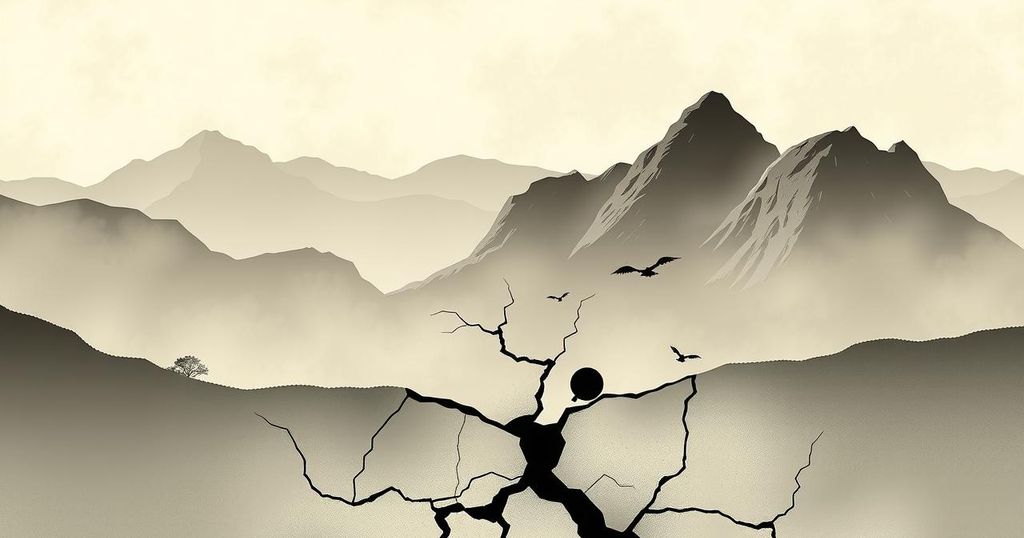Protests in Kinshasa against President Kagame highlight accusations of Rwandan support for M23 rebels in Goma, a city facing significant control and violence. UN experts confirm Rwandan military involvement, though Kagame denies support. The M23’s actions reflect historical tensions rooted in Rwanda’s genocide, with strategic motivations driving their advances on resource-rich regions. The complexity of this situation necessitates international mediation efforts, yet substantial challenges persist.
In Kinshasa, Democratic Republic of Congo, protests against Rwandan President Paul Kagame have intensified as M23 rebels gain control over Goma. Accusations from Congolese protesters and UN experts suggest that Rwanda provides direct military support to M23, including advanced weaponry and training. Goma, a critical trading hub in North Kivu, has become a refuge amid ongoing conflict, further complicating the humanitarian crisis
As fighting escalated in Goma, the Congolese army faced significant challenges, with soldiers reportedly crossing into Rwanda to surrender. Despite Kagame’s denials of backing the M23, evidence compiled by various experts indicates increasing involvement, including support from Rwandan troops. The ongoing violence has been exacerbated by claims of historic animosities dating back to the Rwandan genocide
Accusations against the Congolese military governor regarding ties with Hutu militant groups have heightened tensions. M23’s actions appear to assert political dominance in North Kivu, despite controlling numerous resource-rich areas. Kagame’s insistence on neutralizing perceived threats from Hutu militias drives this conflict, prompting international concern
The M23, originating from earlier conflicts, has demonstrated advanced military capabilities, attributed to reported training and support from Rwanda. Despite efforts from international peacekeeping forces, regional military responses have not effectively contained the group’s resurgence. Recent reports indicate the M23’s strategic capture of mining regions, particularly coltan-rich towns, underscores their intent to monopolize lucrative resources for revenue generation
Evidence also points to sophisticated military technology employed by the M23, including advanced weaponry not accessible to other armed groups in the region. Captured militants report interaction with Rwandan special forces, termed the “Friendly Force.” Rwanda’s ongoing military posture has led to regional instability, with Kagame advocating for discussions centered on Hutu militant activity in the DR Congo
The East African Community is now leading mediation efforts, although President Tshisekedi has expressed reluctance to attend due to escalating tensions. Experts emphasize that the historical context of these conflicts plays a substantial role in their development, particularly Rwanda’s longstanding apprehension regarding Hutu forces. Ultimately, the unfolding situation highlights the complexity and interwoven nature of regional conflicts in Central Africa.
The Democratic Republic of Congo (DRC) and Rwanda have a fraught history marked by ethnic tensions stemming from the Rwandan genocide in 1994. Following the genocide, Hutu militia members, responsible for mass killings, sought refuge in the DRC, establishing armed groups including the Democratic Forces for the Liberation of Rwanda (FDLR). Rwandan President Paul Kagame views these groups as direct threats to national security, prompting military interventions in the DRC over the years. The M23, a rebel group emerging from these tensions, claims to represent the Tutsi minority in eastern DRC, further complicating the security landscape.
The ongoing conflict in eastern DRC, particularly in Goma, underscores a multifaceted crisis driven by historical grievances, ethnic tensions, and regional power struggles. Evidence suggests Rwanda’s substantial backing of the M23 rebels, which has led to further instability and humanitarian challenges. As international and regional efforts for resolution unfold, addressing the root causes of these conflicts remains critical to achieving lasting peace in the area.
Original Source: www.bbc.com




